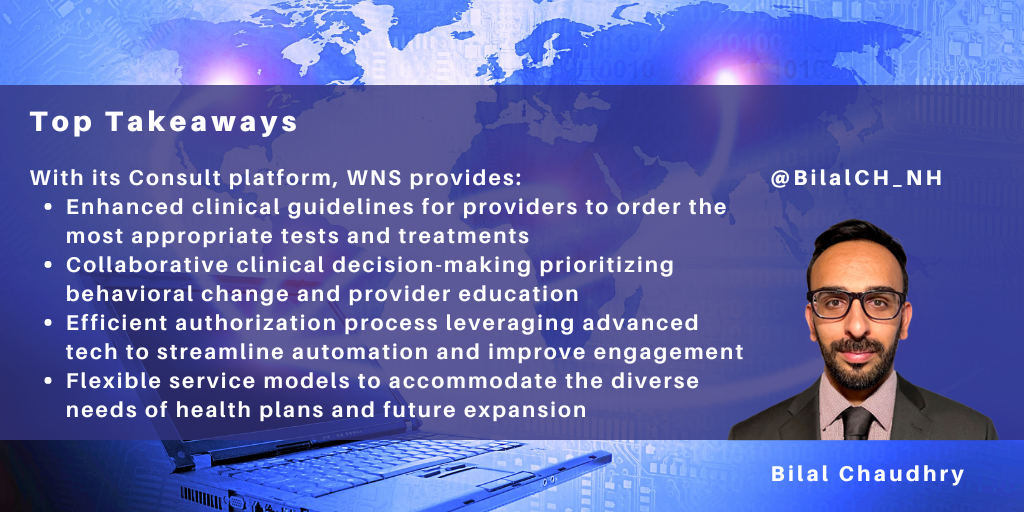Search posts by keywords:
Filter posts by author:
Related Reports
Related NEAT Reports
Other blog posts
posted on Aug 16, 2024 by Bilal Chaudhry

In recent discussions with WNS, NelsonHall explored the company's advanced healthcare management solutions. WNS provides evidence-based criteria to guide providers in ordering the most appropriate tests, procedures, and treatments for their members. This approach enhances patient care delivery and outcomes while improving provider relations and reducing healthcare treatment costs.
For example, a regional health plan was experiencing high prior authorization denial rates and provider dissatisfaction. The WNS Consult™ platform led to a demonstrated net direct savings ROI of 4.9, improved provider satisfaction and overall savings, and reduced prior authorization denial rates.
WNS’ model is proactive and focuses on behavior change rather than denial of services. It involves proactive outreach to ordering providers, offering clinical education with in-house clinicians, and modifying treatment plans to suit patients’ needs while reducing denials and abrasions.
It aims to continue to reform clinical guidance and authorization in two ways: a rigorous approach to clinical guideline development, and leveraging smart technology. At the same time, WNS offers a flexible approach to which activities it performs and which are retained in-house.
A Rigorous Approach to Clinical Guideline Development
Clinical knowledge is derived collaboratively and utilizes ~600 clinicians while promoting proactive peer outreach and integration of practicing physicians. This ensures that clinical decision-making includes comprehensive medical knowledge and real-world practice, leading to the efficacy of healthcare plans.
The platform’s clinical guidelines are based on research across:
- Governmental quality and regulatory guidelines
- Specialty society guidelines
- Evidence-based literature.
The governance model uses an independent panel comprising WNS clinicians and subject matter experts who review and update guidelines quarterly across ~400 topics and seven specialties. This process ensures that the evidence-based guidelines reflect the latest medical research and regulatory standards. These guidelines are then translated into detailed business rules that guide the Consult platform’s clinical decision-making process with branching logic, if-then, and ‘re-direct’ (auto-approval) rules.
Streamlining Authorizations with the Consult Platform
The authorization process begins with an order request submitted by the ordering physician through various channels (e.g., phone, fax, web, EHR). It enters the Consult platform and into its regulatory rule engine, which deciphers the requests against business rules and clinical guidelines. If the rule criteria are not met, the request progresses through a three-tier assessment and review before a denial or authorization is granted:
- Tier 1 – Initial assessment conducted
- Tier 2 – Nurse review
- Tier 3 – Peer-to-peer review.
If an order reaches Tier 3, the peer-to-peer review determines the appropriate course of action, which can result in a major procedure change or withdrawal of the order request. At any of the tiers, notifications are sent to the ordering provider and member if authorization is granted. If a request is denied, WNS issues a denial letter and handles all administrative communications, including denial language.
The Consult platform supports EMR connectivity and API-based architecture to provide seamless integration with existing healthcare systems, facilitating real-time data exchange, and improving the responsiveness of healthcare services. The platform has achieved ~80% automation and ~70% portal adoption, demonstrating high efficiency and user engagement.
The application of predictive analytics and AI within Consult allows for more intelligent decision-making and enhances the ability to forecast patient care needs and outcomes more effectively.
Offering a Flexible Service Model
Recognizing the diverse needs of health plans, WNS offers both delegated and non-delegated models, allowing for flexible integration of their services according to the strategic goals of the health plan. These models range from handing over everything from case intake to appeal management to WNS (delegated model) to health plans opting for non-delegated models, keeping certain services in-house (such as medical necessity decision and appeal management).
Looking Ahead: Continuous Improvement and Expansion
The WNS future roadmap includes clinical and non-clinical investments. Clinical expansion includes increased coverage of genetic testing, oncology clinical pathways, and post-acute programs. The non-clinical expansion includes enhancing the platform’s capabilities to include order pattern intelligence, UMaaS, and enhanced member engagement.
WNS’ initiatives will continue to offer improvements in how healthcare services are managed and delivered, leading to better outcomes for all stakeholders.
